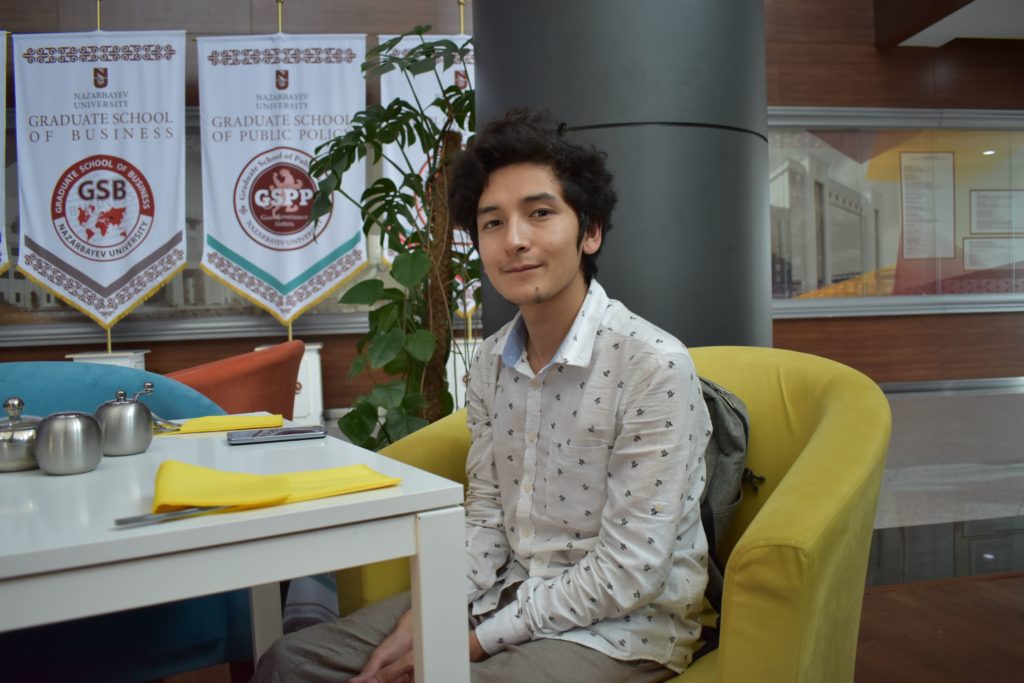ASTANA – One of the most recent trends gaining popularity in Kazakhstan is start-ups. More and more young talents are driven by the idea of starting up a new venture that will bring something not only profitable, but that has value and the capacity to change lives for the better to the marketplace. Some grasp the imagination of the public and succeed, some will fail. All provide an opportunity for Kazakhstan’s young business leaders to learn.
Farmily
Farmily is a five-month-old start-up project founded by a few young enthusiasts who want to change our perception of how supermarkets and restaurants should work. Their idea is to make about 200 types of healthy greens easily accessible and cheap – with minimal damage to the environment.
Founder of Farmily Maulen Akhmetov, is also known for opening one of the first social cafés in Kazakhstan, Kunde, which provides jobs for people with disabilities through its inclusive environment. While running the café, Akhmetov learned that Kazakhstan has problems with the supply of fresh vegetables. The second coldest capital in the world makes harsh conditions for crops and vegetables to grow, leaving its citizens with scant variety in greens. This, in its turn, causes businesses to depend on imports. These are not only suspicious in quality, but expensive, considering their shipping costs.
Farmily aims to address these problems by essentially installing a farm into a supermarket. This way, greens will travel only a tiny distance to reach shoppers.
“The beauty of this technology is that if we know the right conditions – the right temperature, humidity of air, nutrients, et cetera – then, for example, we can grow arugula exactly identical to that which grows [only] in Tuscany. Today we can recreate Tuscany in a box, because the seeds are the same. It is just the environment that we can control,” explained Akhmetov.
Indoor farming is not a brand new idea, but these entrepreneurs believe they can stand out from the crowd.
“The difference [from other similar projects] is that we can make it much cheaper. And second, we know the market of Kazakhstan. Third is something I cannot share,” said Akhmetov.
Akhmetov’s background in literature and social projects at first made him wary of launching a start-up involving science.
“It was difficult to me because I used to understand everything about the business. But here I have to accept that I don’t understand everything. Every single technicality and detail, I trust my team with that,” said Akhemtov.
The project won first place for pitching in the incubation program based in Nazarbayev University, and it has received its first investments. The pilot project should start in a few months.
“One thing good about Kazakhstan is that there is not so many of us. When I was in the [U.S.] for example, [I noticed that] you have to work really hard to show that you’re worth something. It is easier to approach people here. We have a young nation, and everybody wants to help you. So, it is to be bold in terms of approaching people and asking for help. And be humble in terms of learning what they can teach you,” said Akhmetov.
Facial recognition
The experience of Maxim Khagay, who has been in the industry for a few years now but started from scratch, illustrates another side of the coin.
At first, Khagay’s start-up was the development of a face recognition system that would replace the daily routine of showing ID cards at building checkpoints. Unfortunately, the team’s first victories were, in fact, deceptive, and each new detail to consider led to new ups and downs.
“Towards the end we realised that we should give up on this project, as we found out that it won’t be great in its margin. It lacks a good value proposition,” said Khagay.
Thus, they are now doing something called pivoting: redirecting their project toward a new angle.
Khagay points out some of what is lacking in Kazakhstan’s start-up environment, such as the lack of good venture capital investors. (His team, however, was lucky enough to find one.) According to him, the main quality of a good investor is their involvement.
“The right venture investor should act like your business partner, choose a business model, interact with you, and show you directions. Investors like that are very rare,” said Khagay.
Rather, the typical investor in Kazakhstan is just a business person who hands over some money to a start-up and then expects to receive half of its profits, without being very interested in actually achieving their goal.
A lack of experience as entrepreneurs created challenges for Khagay’s team. One of his biggest regrets is being too absorbed by his idea without thinking of the needs of possible clients.
“Thinking about your client is important. Because in the end, it is your client who decides whether your idea will be implemented or not,” said Khagay.
Another problem was building a business team. The young entrepreneur said he sacrificed time with his family, as well as proper meals and a good night’s sleep, but the hardest thing was to get a good business team.
“We had a technical team, but we didn’t have people who understood business – people who could go to make deals, negotiate terms and financial models,” said Khagay.
One more feature of a successful start-up, which applies to the world as whole, is the value that it brings. Khagay believes that as long as your idea solves the problem of your client, nobody cares whether you use advanced technologies or not.
“One might have the most sophisticated technology the world has ever seen, but if there is a little value, then nobody cares,” he said.
Despite the temporary misfortunes, the team is ready to start fresh. With experience under their belts, they have great hopes for their future projects.
“We’ve got a great team. We’ve learned a lot together. And I believe I know how to start next time, and get the idea to its finish,” Khagay concluded.



